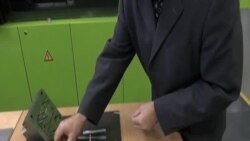The recent news that data from 40 million credit and debit cards used at Target department stores was hacked has raised concerns about the security of plastic bank cards. These contain financial information on a magnetic strip or a memory chip embedded in the plastic. A new method of storing encrypted data is in its early stages, but the company developing the technology says some credit card companies are paying close attention.
Most credit and debit cards today use magnetic strips that hold the data about the owner’s bank account and personal identification number called a PIN.
Other credit cards hold the data in memory chips that communicate wirelessly with card readers. Both systems are vulnerable. Criminals can steal the data by hacking into the banks’ or retailers' computer systems or, as in the case of Target, tampering with card readers in stores.
Now, scientists in Britain say they are developing a way to make encrypted data more secure by storing it in the plastic itself.
Gordon Smith, a professor emeritus at Warwick Manufacturing Group, at the University of Warwick, said researchers are manipulating a plastic molding machine to use the colors of the card to encrypt data.
“As it's making that plastic from a molten plastic into a solid component, we are moving the pigments such that they form specific images,” he said.
The way the pigment is configured inside the plastic ensures the security of the data. When the card is passed through a special scanner, similar to magnetic strip readers, the software reads the embedded image containing the data.
“When we first developed the images within the plastic, it looked as though it would just be an aesthetic aspect to it, but then we've realized that once we could make it covert, we could color the plastic so that the image was hidden, then it became something a lot more special," said Smith.
Smith admits the system could be compromised if someone discovers how the card was made, though he said that's unlikely. The counterfeiter would need to have access to an injection molding machine that costs more than $300,000.
The patents for this new method are pending, and it has not been used commercially at all. Smith said some credit card companies, however, already have indicated they are interested in the technology.
Most credit and debit cards today use magnetic strips that hold the data about the owner’s bank account and personal identification number called a PIN.
Other credit cards hold the data in memory chips that communicate wirelessly with card readers. Both systems are vulnerable. Criminals can steal the data by hacking into the banks’ or retailers' computer systems or, as in the case of Target, tampering with card readers in stores.
Now, scientists in Britain say they are developing a way to make encrypted data more secure by storing it in the plastic itself.
Gordon Smith, a professor emeritus at Warwick Manufacturing Group, at the University of Warwick, said researchers are manipulating a plastic molding machine to use the colors of the card to encrypt data.
“As it's making that plastic from a molten plastic into a solid component, we are moving the pigments such that they form specific images,” he said.
The way the pigment is configured inside the plastic ensures the security of the data. When the card is passed through a special scanner, similar to magnetic strip readers, the software reads the embedded image containing the data.
“When we first developed the images within the plastic, it looked as though it would just be an aesthetic aspect to it, but then we've realized that once we could make it covert, we could color the plastic so that the image was hidden, then it became something a lot more special," said Smith.
Smith admits the system could be compromised if someone discovers how the card was made, though he said that's unlikely. The counterfeiter would need to have access to an injection molding machine that costs more than $300,000.
The patents for this new method are pending, and it has not been used commercially at all. Smith said some credit card companies, however, already have indicated they are interested in the technology.





